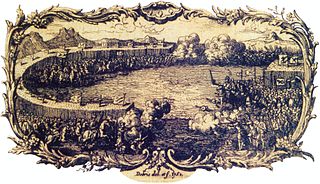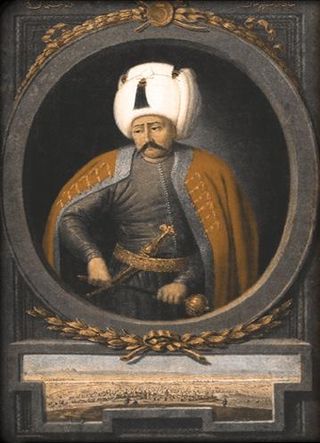
Sebastian was King of Portugal from 11 June 1557 to 4 August 1578 and the penultimate Portuguese monarch of the House of Aviz.

The Battle of Alcácer Quibir was fought in northern Morocco, near the town of Ksar-el-Kebir and Larache, on 4 August 1578.

Ksar el-Kebir, also known as al-Qasr al-Kabir, is a city in northwestern Morocco, about 160 km north of Rabat, 32 km east of Larache and 110 km south of Tangier. It recorded a population of 126,617 in the 2014 Moroccan census.

Abu Marwan Abd al-Malik I, often simply Abd al-Malik or Mulay Abdelmalek, was the Saadian Sultan of Morocco from 1576 until his death right after the Battle of al-Kasr al-Kabir against Portugal in 1578.

The Saadi Sultanate, also known as the Sharifian Sultanate, was a state which ruled present-day Morocco and parts of Northwest Africa in the 16th and 17th centuries. It was led by the Saadi dynasty, an Arab Sharifian dynasty.

Ahmad al-Mansur (Arabic: أبو العباس أحمد المنصور, Ahmad Abu al-Abbas al-Mansur, also Ahmad al-Mansur al-Dahabbi, and Ahmed al-Mansour was the Saadi Sultan of Morocco from 1578 to his death in 1603, the sixth and most famous of all rulers of the Saadis. Ahmad al-Mansur was an important figure in both Europe and Africa in the sixteenth century. His powerful army and strategic location made him an important power player in the late Renaissance period. He has been described as "a man of profound Islamic learning, a lover of books, calligraphy and mathematics, as well as a connoisseur of mystical texts and a lover of scholarly discussions."

The Wattasid dynasty was a ruling dynasty of Morocco. Like the Marinid dynasty, its rulers were of Zenata Berber descent. The two families were related, and the Marinids recruited many viziers from the Wattasids. These viziers assumed the powers of the Sultans, seizing control of the Marinid dynasty's realm when the last Marinid, Abu Muhammad Abd al-Haqq, who had massacred many of the Wattasids in 1459, was murdered during a popular revolt in Fez in 1465.
The military history of Morocco covers a vast time period and complex events. It interacts with multiple military events in a vast area containing North Africa and the Iberian Peninsula.
Abdul Malik is an Arabic male given name and, in modern usage, surname. It is built from the Arabic words Abd, al- and Malik. The name means "servant of the King", in the Christian instance 'King' meaning 'King of Kings' as in Jesus Christ and in Islam, Al-Malik being one of the names of God in the Qur'an, which give rise to the Muslim theophoric names.

The Loukkos River is a major river in northern Morocco. Although it is relatively short, the river is the third largest in Morocco with an average flow of 50 m³/s. The Loukkos river's source is located in the Rif Mountains and flows into the Atlantic Ocean in the city of Larache; the city's port is on the river. The Loukkos river basin is 3,730 km2 and contains one of the most fertile and productive agricultural lands in the country. One of the river's tributaries, Oued Makhazine, bears great historical importance since it witnessed one of the most decisive battles in the history of Morocco: the Battle of Alcácer Quibir. In the battle on 4 August 1578, the joint army of deposed Moroccan monarch Abu Abdallah Mohammed II Saadi and his ally, King Sebastian of Portugal, was defeated by the army of the new Moroccan sultan from the same Saadi dynasty.

The Capture of Fez occurred in 1576 at the Moroccan city of Fez, when an Ottoman force from Algiers supported the prince Abd al-Malik in gaining the throne of the Saadi Sultanate against his nephew and rival claimant Mulay Muhammed al-Mutawakkil in exchange for making the Sultanate an Ottoman vassal.

Moroccan–Portuguese conflicts refer to a series of battles between Morocco and Portugal throughout history including Battle of Tangier, Fall of Agadir and other battles and sieges in the Moroccan coast.

Turkey–Morocco relations are the foreign relations between Morocco and Turkey, and spanned a period of several centuries, from the early 16th century when the Ottoman Empire neighbored Morocco and had an expedition there until modern times.
Abdul Malik is a given name.
Muley Xeque was a Moroccan prince, born in Marrakech in 1566 and died in Vigevano in 1621. Exiled in Spain, he converted to Catholicism in Madrid and was known as Felipe de África, Philip of Africa or Philip of Austria, in addition to the nickname of The Black Prince.

The Ottoman Empire was founded at the beginning of the 14th century. Beginning in the 16th century, it also began acquiring possessions following series of wars in coastal North Africa.
The Conquest of Fez or Capture of Fez took place in 1554 between the Algerian forces of Salah Rais and the ruler of the Saadi Sultanate, Mohammed ash-Sheikh. The battle took place on 7 January at Qudyat-al-Mahali, a suburb near Fez and occurred after Salah Reis’ two previous victories against the Saadians, one at Taza and another at the Sebou river. One of the objectives of the expedition is to restore Ali Abu Hassun, a Wattassid pretender, to the throne.

In the 16th century the Ottomans undertook several expeditions to Saadi Sultanate
Sahaba el-Rehmania was the wife of the Moroccan sultan of the Saadian dynasty Mohammed al-Shaykh and the mother of Abu Marwan Abd al-Malik. Gifted in diplomacy, she held a leading political role throughout her life. She was ambassador to the Ottoman Empire at the court of Sultan Murad III.












